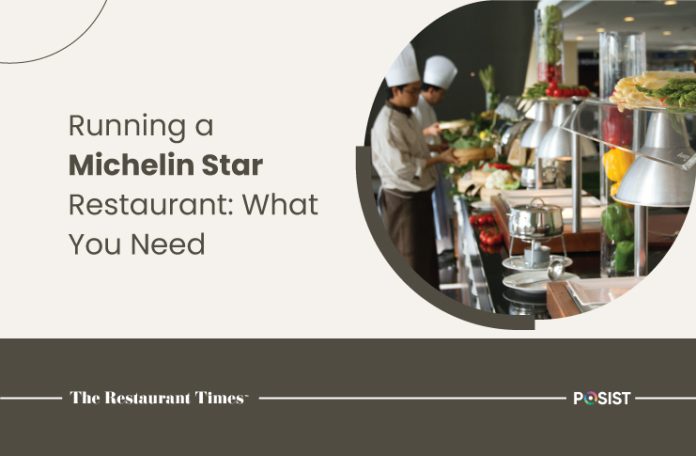Have you ever wondered about the elusive Michelin Stars and what they mean for restaurants? In today’s dining landscape, where choices abound, Michelin Stars are a reliable way to judge a restaurant’s quality. These are part of a globally recognized rating system rooted in the Michelin Guide in Paris.
Michelin Stars are all about the dining experience, a reflection of how outstanding a restaurant’s food is. But here’s the catch — these stars aren’t awarded to chefs; they’re bestowed upon the restaurant. Earning one or more Michelin Stars can be a game-changer, drawing media attention, new patrons, and industry respect.
Michelin Stars have long been a symbol of culinary excellence, but their criteria and significance often must be clarified. So, let’s demystify the world of Michelin Stars. Continue reading to understand the Michelin Star rating and how it works.
1. What Is a Michelin Star Restaurant?
The Michelin Star is a global rating system that ranks restaurants based on five criteria, all centered around the food they put on the plate. Getting a Michelin Star has been referred to as any restaurant’s pinnacle accomplishment. The stars are awarded annually, and restaurants must maintain their rating to keep it.
The criteria are quality of ingredients, harmony of flavors, mastery of cooking technique, how the chef’s personality comes out through the dish, and consistency across the menu and over time.
Restaurants are unaware when they are being regarded as a Michelin Star because Michelin restaurant inspectors are knowledgeable professionals in the food and beverage industry who visit and evaluate restaurants anonymously.
2. Curious About the Michelin Guide?
Before learning about Michelin Stars, you must be introduced to the Michelin Guide.
The Michelin Guide is a red book millions of chefs dream of being listed in.
Going to a restaurant listed in this guide would make your day, and you might never want to try another place. On average, people spend around 10–20 times more at a Michelin Star restaurant.
Read on to learn more about how restaurants get awarded Michelin Stars and why people spend almost half their salaries on expensive food.
2.1. A Brief History of the Michelin Star
Originating in France, Michelin Star ratings were first published in 1900 as a feature in the Michelin Guide by Andre and Edouard Michelin — the founders of the Michelin tire company.
The two brothers started the company in 1889 with the idea to help the then-limited number of drivers make more journeys and buy more tires. The guide had a comprehensive list of motorists, which included information on where to find the best meals while touring. The guide became more popular as the business grew because of its dining element.
The high demand led the Michelins to set up a team of inspectors to visit and rate restaurants. With time, some people have also started considering the Michelin Guide as the bible of all dining guides!
The Michelin Guide now covers 30 countries across three continents.
2.2. Are Michelin Stars Permanent?
Unlike the actual stars in the sky, Michelin Stars are not permanent. This is to say that these stars are not bound to stay in the hands of a chef once they are awarded to them.
A restaurant could get a star and lose it the following year.
Similarly, restaurants can also get demoted in the number of stars they hold. At the end of the day, it’s the quality of their food and service that matters to the Inspectors, and the restaurant can also lose or gain the Michelin Stars.
2.3. Are All Michelin Star Restaurants Expensive?
The first criterion to get a Michelin Star is to ensure that you have a fine dining restaurant. That said, these restaurants aren’t necessary to be expensive.
These restaurants are expensive because of the heavily-priced ingredients and the supreme hospitality they provide to their guests.
2.4. What About Michelin Inspectors?
Being a Michelin Inspector is a considerable responsibility. A typical Michelin Inspector goes through an extensive six-month training course, after which they have to work with an experienced inspector for a while.
Once you become a Michelin inspector, your name is kept secret. An inspector isn’t even allowed to write anything while eating at a restaurant.
To assess a restaurant, they visit the same place at least 2–3 times to have a taste of all the restaurant’s bestsellers. This also allows them to see whether or not the restaurant’s quality is consistent.
3. What Do the Michelin Ratings Mean?
The Michelin Guide is a prestigious restaurant guidebook that awards stars to restaurants based on quality. Here’s what each rating means:
- One Star: ‘A very good restaurant’ – The restaurant receives one Michelin Star because it is a pretty good restaurant in its bracket. A restaurant receives one star if it consistently serves food of a high caliber and standard. As a result, they are deemed worthwhile for a visit.
- Two Stars: ‘Excellent cooking, worth a detour’ – A restaurant with two Michelin Stars must offer exceptional cuisine where diners eat exceptionally well-prepared dishes. The service at these restaurants is impeccable, and the wine collection is impressive. In addition, the chef masters the art of flavor, cooking techniques, and preparing generous portions.
- Three Stars: ‘Exceptional cuisine, worth a special journey’ – The best dining experience in the world is recognized by three Michelin Stars, and traveling any distance to eat at such a place is deemed worthwhile. It could be considered an essential stop on any tour for foodies. The restaurant serves extraordinary cuisine, using rare and high-quality ingredients and demonstrating exceptional culinary skills.
- Green Star: It’s an environmental sustainability standalone distinction provided alongside other distinctions. A Green Star restaurant prioritizes and demonstrates a commitment to ethical and environmental standards besides culinary excellence. The Green Star focuses on a restaurant’s efforts to reduce its environmental impact, such as sourcing locally, minimizing food waste, promoting eco-friendly practices, and emphasizing sustainability in its operations.
- Bib Gourmand: As mentioned earlier, Michelin Star restaurants aren’t all necessarily expensive. The Michelin Guide awards the best value-for-money restaurants with a special award — Bib Gourmand. So, besides the usual factors, the inspectors place a price ceiling on the dishes depending on the cost of living in the respective country. So, when they encounter a reasonably priced restaurant with exceptional quality food, it becomes eligible for the coveted Big Gourmand distinction.
4. Michelin Star Criteria
The specific requirements that must be satisfied to earn a Michelin Star are not published or otherwise made public by Michelin. In this way, a chef can never be sure when they are being critiqued for star qualification.
However, here are a few standard criteria required to run a Michelin Star restaurant:
- Quality of a product
- Strong management
- Attention to detail
- Quality-to-price ratio
- Adaptability
Additionally, your restaurant must be located within the coverage area to receive a star from the Michelin Guide. Currently, Michelin only has operations in 28 nations. Therefore, your restaurant will not be given a Michelin Star if it is in one of the nations on this list.
5. How Do Restaurants Get Michelin Stars?
Again, although there are no set standards, chefs can increase their chances of being chosen as a star by paying attention to all aspects of their restaurants, not just the food. Here are a few additional tips that can help you earn Michelin Stars:
5.1. The Finest Ingredients
Any great chef can attest to the importance of ingredients. Michelin-starred chefs have been known to source unique, difficult-to-find ingredients, directly partnering with farmers, artisan bakers, cheese-makers, and so forth to procure only the best, most unique ingredients to achieve this. A Michelin Star can’t be earned by cutting corners.
5.2. Consistency
A restaurant must consistently provide outstanding food and service. One single inspector will not grant you Michelin Star. No, several inspectors would visit your restaurant, so keep up the performance consistently.
5.3. Cleanliness
Keeping your Front-Of-House and Back-Of-House clean is crucial to providing your customers with a wonderful dining experience. To unleash their creative energies, chefs must work in a spotless, neatly organized kitchen.
Plus, a clean kitchen makes it simple to maintain food hygiene. Make sure everyone on your staff feels comfortable being clean at work. This will improve the quality of your restaurant and raise customer satisfaction levels.
5.4. Positive Reviews
The Michelin guide monitors chefs who view cooking as a true art form and exhibit exceptional mastery of cooking methods. You must ensure your restaurant has many glowing online reviews to catch their attention.
Additionally, avoid needless marketing gimmicks and concentrate on obtaining genuine customer reviews. Instead, invite well-known bloggers and food critics and ask them for honest reviews. Their reviews might pique the interest of Michelin inspectors and prompt them to stop by your restaurant.
5.5. Innovation
You should strive to stand out as a chef instead of trying to live up to someone else’s expectations.
Consider it this way: If your restaurant serves the same food that every other restaurant in the area serves, why would the Michelin Guide give it a special mention?
Chefs who have mastered culinary skills and know the nuances of the cuisine they serve are honored by Michelin.
So by honing your abilities, develop your distinctive style and master food taste. Follow current culinary trends and use your knowledge to create dishes that showcase your creativity and talent.
5.6. Investment
Although it might be alluring, bankrolling a restaurant’s profits won’t get it a Michelin Star. The key is to use those profits to make additional investments in the restaurant, including upgrades to the interior design, staff training, sourcing of higher-quality ingredients, etc.
If a Michelin inspector notices a restaurant, no matter how good it is, continuously striving to improve rather than simply relaxing on its achievements, it could mean the difference between success and failure.
It’s not unusual for a restaurant to invest millions in upgrades before recouping the cost (plus more) from the increased sales that a Michelin Star can bring.
5.7. Meticulousness
Every night must be handled as if it were the night of a Michelin inspection by the restaurant owner. The staff and chefs must undergo thorough training to ensure everyone cooperates and follows the same procedures.
A restaurant can only be considered for a Michelin Star if it makes every effort to make every diner’s experience on any given night exceptional.
5.8. Walk to Canossa
This phrase refers to King Henry IV confessing his sins and apologizing to the pope. It’s also the catchphrase for the custom in which chefs vying for Michelin Stars would fly to Paris to meet with the publication’s editors and argue the case for their restaurants.
According to rumors, this still happens occasionally, even though it’s not as frequent as it once was.
6. Conclusion
Remember, Michelin Stars are a coveted recognition in the culinary world. Earning them requires a combination of factors, including attention to detail, commitment to quality, and a passion for great food.
The reviewers for Michelin rate every aspect of a restaurant, including the wait for a table, the friendliness of the staff, the standard and originality of the food, and the atmosphere as a whole.

















